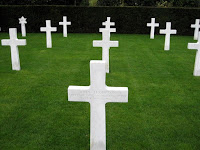 Veterans Day - our opportunity to honor the men and women who have served in the armed forces. It's a very special day for many families and can be (should be) a day of recollection for all of us.
Veterans Day - our opportunity to honor the men and women who have served in the armed forces. It's a very special day for many families and can be (should be) a day of recollection for all of us.Americans originally celebrated Veterans Day as Armistice Day on November 11, 1919. President Woodrow Wilson called for a moment of silence exactly one year after Germany signed the World War I Armistice document, at the 11th hour of the 11th day of the 11th month. The President used these words. "To us in America, the reflections of Armistice Day will be filled with solemn pride in the heroism of those who died in the country’s service and with gratitude for the victory, both because of the thing from which it has freed us and because of the opportunity it has given America to show her sympathy with peace and justice in the councils of the nations…" In the aftermath of World War II and the Korean War, Armistice Day became Veterans Day, a holiday dedicated to American veterans of all wars.
 We associate Veterans Day not only with peace, but with war. We celebrate with flags, memorials, parades, and acts of kindness for members of the military. We have a collective hug to let them know that we owe them our way of life. Whatever time of year, it makes me teary-eyed to hear someone walk up to a uniformed member of the armed forces and thank him/her for service.
We associate Veterans Day not only with peace, but with war. We celebrate with flags, memorials, parades, and acts of kindness for members of the military. We have a collective hug to let them know that we owe them our way of life. Whatever time of year, it makes me teary-eyed to hear someone walk up to a uniformed member of the armed forces and thank him/her for service.Today, veterans will be remembered in ways large and small. Whatever you choose to do, please do something. Donate to a charity for veterans. There should be no veterans sleeping in tents this winter because they are homeless. We need to end that national disgrace. Support companies hiring veterans. How disappointing it must be to come home from war to an economy with no job for you! Attend a local ceremony. We have many in our area.
I saw this on Facebook and smiled through the tears. It's a timelapse of a homeless veteran being given a makeover - a second chance. You won't be sorry if you click on it. Hope is a blessing.
We owe our veterans so much. Millions of men and women served in Iraq and Afghanistan. I don't think we can ever fully repay them for their bravery, patriotism, and suffering. There are men and women lying in military hospitals around the country, their bodies and lives shattered. I'm not sure how we can do enough to help them, but I am sure that we all need to try.
The poppies
 referenced in In Flanders Fields grew in profusion in Flanders, France in the disturbed earth of the battlefields and cemeteries where war casualties were buried - and thus became a symbol of Remembrance Day. The poem is often part of Remembrance Day solemnities in Allied countries that contributed troops to World War I, particularly in countries of the British Empire that participated.
referenced in In Flanders Fields grew in profusion in Flanders, France in the disturbed earth of the battlefields and cemeteries where war casualties were buried - and thus became a symbol of Remembrance Day. The poem is often part of Remembrance Day solemnities in Allied countries that contributed troops to World War I, particularly in countries of the British Empire that participated.The poem In Flanders Fields was written after Canadian physician Lieutenant Colonel John McCrae witnessed the death, and presided over the funeral, of a young friend, Lt. Alexis Helmer. By most accounts it was written in his notebook the day after the funeral. Because of this poem, poppies have become a symbol of the Armistice.
My mother has a photo of the President of the United States holding her as she gave him a poppy on Veterans Day. As I was growing up, I never fully appreciated the significance of that photo. I do now.
In Flanders Fields the poppies blow
Between the crosses row on row,
That mark our place; and in the sky
The larks, still bravely singing, fly
Scarce heard amid the guns below.
We are the Dead. Short days ago
We lived, felt dawn, saw sunset glow,
Loved and were loved, and now we lie
In Flanders fields.
Take up our quarrel with the foe:
To you from failing hands we throw
The torch; be yours to hold it high.
If ye break faith with us who die
We shall not sleep, though poppies grow
In Flanders fields.
Between the crosses row on row,
That mark our place; and in the sky
The larks, still bravely singing, fly
Scarce heard amid the guns below.
We are the Dead. Short days ago
We lived, felt dawn, saw sunset glow,
Loved and were loved, and now we lie
In Flanders fields.
Take up our quarrel with the foe:
To you from failing hands we throw
The torch; be yours to hold it high.
If ye break faith with us who die
We shall not sleep, though poppies grow
In Flanders fields.
Thank you to all the members of the military - past and present - and your families for your sacrifices. We love you.
Photos courtesy of hitchinpeople.co.uk and members.virtualtourist.com
















6 comments:
What a beautiful tribute! Thanks for sharing your thoughts through your wonderful words.
Beautiful Tribute! Thanks for sharing your thoughts so well. Loved the link as well.
On this day, I would encourage anyone who has a charitable heart to look into the annual community-based intervention program for homeless vets called Stand Down. It was started by the Department of Veteran Affairs and takes place in communities throughout the country; usually on a summer weekend. And, although it is only November, those angels who organize these events are already busy gathering donations, organizing services, and securing facilities for the next Stand Down. If you're inclined to do something for homeless vets, Stand Down provides a wonderful opportunity.
Any homeless vet in need of housing assistance, a job, food, clothing, medical attention, dental work, counseling, or just a hot shower, shave, and a haircut is welcome. There is no such thing as failure at Stand Down. Every vet who participates has chosen hope and light over despair and darkness--even if only for a day or two. For many vets, the experience is the beginning of a transformation which sets them on the path towards reclaiming their life and getting off the streets. For others, it is just a brief bright spot in a world of depression. But, in either case, participants come away from Stand Down knowing that they have not been forgotten.
Thank you, Sandi.
Eileen, as a VHA contractor, I am so impressed by what the department is doing to make our veterans' lives better. Everyone is so committed.
Hi. Charlestongirl,
For years one of my aunts, who was a dental hygienist, volunteered at Stand Down along with several others from the dental office where she worked. She'd clean the vets' teeth and take x-rays before they were seen by the dentist. Simple things (routine fillings, extractions, etc.) that could be done "in the field", were done on the spot. If the problems were complex, the vet would be given an appointment card and told to come to the office for the rest of their treatment. Transportation would also be arranged. She said appointments were unrealistic for many homeless, but they seemed to like the idea, the importance and responsibility, of having an appointment. Since life on the streets can be unpredictable, the reality was they'd work the vets in whenever they managed to show up. My aunt said she and the rest of the staff were always so pleased and gratified at how many of the vets actually came in for treatment.
I have no doubt that many of the angels that walk amongst us are of the earthly kind :-)
Post a Comment